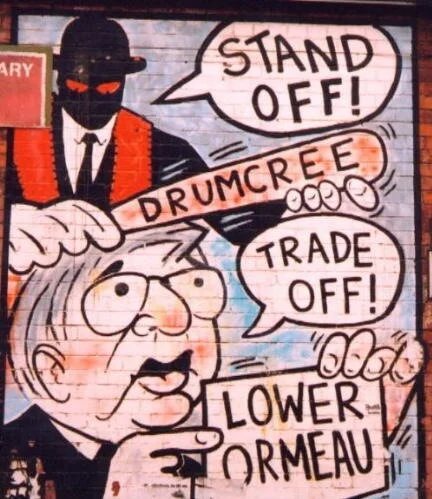Communities Sacrificed For Political Expediency?
As details continue to emerge from various sources regarding the Report of the Strategic Review Body on Parades, it is clear that its recommendations are predicated on two events:
1. The ability of the British government and its allies in the Six Counties to continue to proceed and implement the 30-year-old strategy of Normalisation.
2. Equally important to the implementation of the Report’s recommendations is the ability of those parties involved in the Six-County administration to engage in a blatant and unprincipled political trade-off. That the issue of sectarian marches and, indeed, the rights of people living in communities directly affected by such annual coat-trailing invasions are now to be considered as mere pawns in a political horse-trading exercise could not be made any clearer than is stated in the Report – “We also recognise that transferring responsibility for public assemblies to the Northern Ireland (sic) Executive will not happen in isolation. The transfer of policing and justice to the Executive is part of the wider jigsaw of politics in Northern Ireland (sic) and progress in these areas is very likely to affect progress on the transfer of responsibility for parading issues.”
While media reports attempt to suggest that the document seeks to take a human rights approach, this clear linkage made in the Review Body’s Report shows that its value exists only in its potential to act as political leverage with unionism - accept ‘devolution of policing and justice powers’ and, in return, receive the vehicle by which sectarian marches can potentially be delivered.
In short, this Report’s recommendations will result in decisions being made on the grounds of political expediency, rather than on a genuine human rights basis.
However, the spin-doctors have already been at their work to try and hide this harsh reality. Thursday’s (April 24) UTV news saw political correspondent Ken Reid convey a mistaken impression that the Ormeau and Garvaghy Roads were somehow excluded from any future parades decisions. Indeed, Friday’s (April 25) Irish News was also the victim of similar spin when it declared, wrongfully, that “parades on the Garvaghy Road and Ormeau Road will not be within any new body's remit.”
There is only one reference to the Ormeau and Garvaghy Roads in the entire Report. It comes immediately after the paragraph regarding transfer of powers (quoted earlier) and states: “There are two further issues that we have still to finalise and these will form a critical part of our further discussions following publication of this report. They are the parades at Drumcree and the Ormeau Road and the interpretation of the rules set out in our Standards with regard to the UVF 1912 flag and the YCV flag. We recognise that these are of vital importance and hope that, after further consultations, we are in a position to make recommendations to the (British) Government on these matters when we deliver our final report in the autumn of 2008.”
Éirígí spokesperson Daithí Mac an Mháistír expressed solidarity with the vulnerable nationalist communities who are now under renewed threat from sash-wearing sectarian bully-boys.
“Éirígí shares the concern that is growing within the affected communities about the various recommendations made by this Review Body, whose chair, Paddy Ashdown, has a long record of service in the British military and political establishment.
“Local councils, many of which are themselves a by-word for discrimination and bigotry, and the Six-County administration will have a direct input into the decision-making process on contentious sectarian parades. This has the unprecedented potential to turn the marching issue into a major political football, where sheer politically expediency, and not valid human rights concerns, will take precedence.
“Éirígí is also gravely concerned that, far from protecting the right of people to live free from sectarian harassment, this Review Body has effectively undermined that right, which was won at a very high price by vulnerable nationalist communities. Indeed, when referring to rights, the Review Body unashamedly downgrades the right to freedom from sectarian harassment to that of freedom from harassment.
Daithí concluded: “By the removal of this one word, this Review Body has demonstrated conclusively that it has totally failed to understand and appreciate the deep sense of fear, outrage and humiliation that has marked these annual sectarian incursions into the streets of communities across the Six Counties.”


